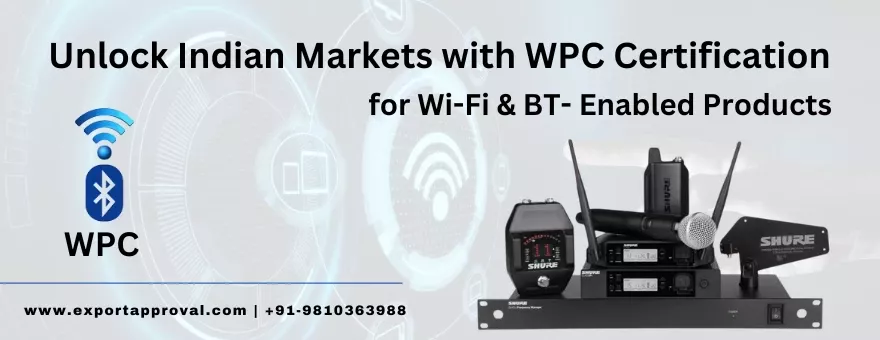WPC Certificate for Exporting Wireless Products to India - Why it Matters?

Wireless products encompass a wide range of technologies and devices that operate without physical cables or connections. These products leverage wireless communication protocols such as Wi-Fi, Bluetooth, NFC and cellular networks to transmit data, enabling seamless connectivity between devices. Examples include wireless routers for internet access, Bluetooth headphones, smartwatches and smartphones. The advancement of wireless technology has led to the proliferation of smart homes, where devices like thermostats, cameras and speakers communicate wirelessly for enhanced automation and control. Additionally, the development of 5G technology has ushered in faster and more reliable wireless networks, paving the way for innovations in areas such as augmented reality, virtual reality and the Internet of Things (IoT).
Exporting wireless products to India involves navigating various regulatory and compliance aspects. It is essential to comply with the Wireless Planning and Coordination (WPC) Wing, Ministry of Communications, India, which regulates the use of wireless spectrum and the import of wireless equipment. Importers need to obtain the Equipment Type Approval (ETA) from the WPC for wireless devices. Additionally, some products should comply with the relevant Bureau of Indian Standards (BIS) specifications and obtaining the BIS certification is often mandatory for electronic goods. Importers must ensure that their wireless products adhere to India's specific frequency bands and technical standards.
What is a WPC Certificate?
The WPC (Wireless Planning and Coordination) Certificate is a regulatory approval issued by the WPC Wing of the Ministry of Communications in India. This certification is mandatory for wireless and electronic products to ensure that they comply with the specified standards and regulations related to the use of radio frequency spectrum. The WPC is responsible for managing the allocation and utilization of the radio frequency spectrum in India.
To import and sell wireless products in India, manufacturers and importers need to obtain the WPC Certificate. This certification verifies that the wireless devices adhere to the technical and operational requirements set by the WPC. It ensures that the products will not interfere with other wireless communications and comply with the prescribed standards.
Obtaining the WPC Certificate involves a thorough evaluation of the product's specifications, including its frequency range, power output and other relevant technical parameters. It is a crucial step in the regulatory compliance process for wireless products entering the Indian market.
Importance of WPC Certificate for Exporting Wireless Products to India
The WPC (Wireless Planning and Coordination) Certificate holds significant importance for exporting wireless products to India due to its role in ensuring regulatory compliance and adherence to technical standards. Several key reasons underscore the importance of obtaining the WPC Certificate:
- Legal Requirement: The WPC Certificate is a legal requirement in India for importing and selling wireless products. It is mandatory under the Indian Wireless Telegraphy Act and non-compliance can lead to legal consequences, including product seizures and fines.
- Spectrum Regulation: The WPC is responsible for managing the allocation and use of radio frequency spectrum in India. The certificate ensures that wireless products operate within specified frequency bands, minimizing interference with other communication systems and maintaining efficient spectrum utilization.
- Technical Compliance: The WPC Certificate verifies that the wireless products meet the technical standards and specifications set by the WPC. This includes parameters such as frequency range, power output and modulation schemes, ensuring that the devices align with Indian regulatory requirements.
- Consumer Safety: Compliance with WPC regulations helps ensure the safety and reliability of wireless products for consumers in India. The certification process involves rigorous testing to verify that the products do not pose risks such as excessive radiation or interference.
- Market Access: Without the WPC Certificate, wireless products may face barriers to entry into the Indian market. Many retailers, distributors and consumers may insist on products having the necessary certifications to ensure that they meet national standards and regulations.
- Customs Clearance: Customs authorities in India often require proof of regulatory compliance, including the WPC Certificate, for clearing imported goods. Lack of certification can lead to delays and complications in the customs clearance process.
- Business Credibility: Having the WPC Certificate enhances the credibility of the exporter and the product in the Indian market. It demonstrates a commitment to quality and compliance with local regulations, fostering trust among consumers and business partners.
What products are covered under the WPC Certificate?
The WPC Certificate covers a wide range of products, including all Wi-Fi and Bluetooth-enabled devices such as wireless mouse, wireless speakers, Bluetooth headphones, etc.
Check out the complete list of products that require a WPC Certificate.
Conclusion
Export Approval plays a vital role in navigating the process of obtaining a WPC Certificate for exporting products to India. Our expertise in regulatory compliance, effective communication skills and ability to manage documentation and timelines contribute significantly to a successful certification process.
Please reach out to us with your product details at +91-9250056788.

